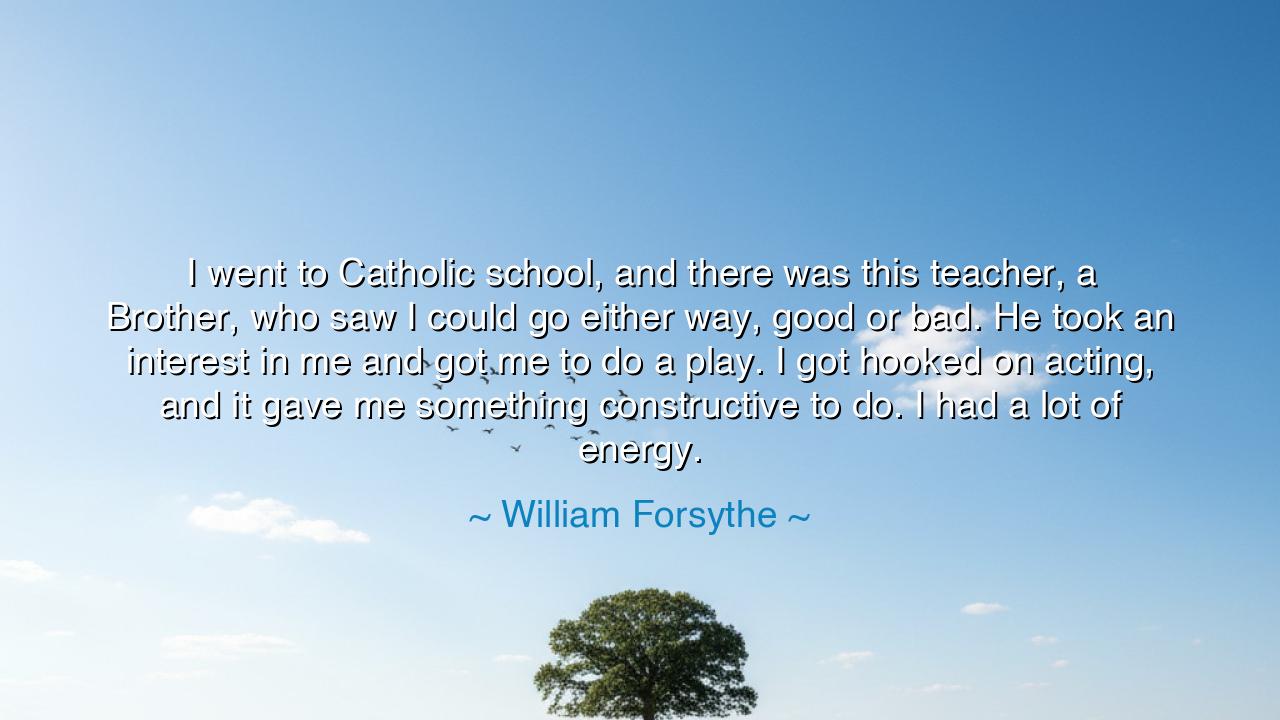
I went to Catholic school, and there was this teacher, a
I went to Catholic school, and there was this teacher, a Brother, who saw I could go either way, good or bad. He took an interest in me and got me to do a play. I got hooked on acting, and it gave me something constructive to do. I had a lot of energy.






Hear the confession of William Forsythe, spoken with gratitude and remembrance: “I went to Catholic school, and there was this teacher, a Brother, who saw I could go either way, good or bad. He took an interest in me and got me to do a play. I got hooked on acting, and it gave me something constructive to do. I had a lot of energy.” These words are not merely the recollection of a childhood moment, but a testimony to the power of guidance, the strength of mentorship, and the redemptive force of art.
The heart of this tale lies in the watchful gaze of the teacher. For in every youth there exists a crossroads, a place where the soul may turn toward light or toward shadow. The Brother saw in Forsythe not merely a restless boy, but the potential for greatness—untamed energy that could destroy or create. It is often so with the young: the same fire that burns in rebellion may also illuminate the stage, the workshop, or the temple, if only one elder has the wisdom to guide it. Thus this story is not about school alone, but about the eternal dance between chaos and discipline, between misdirection and purpose.
The play became the turning point, for art has always been the vessel through which raw passion is refined. In the ancient theaters of Greece, wild emotions found form upon the stage, and tragedy itself became a path to wisdom. So too with Forsythe: the act of embodying characters, of speaking words not his own, allowed his restless spirit to channel its force into creation. What might have been wasted in rebellion was transformed into expression. The stage became a temple, and acting the ritual through which his soul found shape.
History is filled with such transformations. Consider the tale of Ignatius of Loyola, a soldier wounded in battle. His energy, once spent on war and vanity, was redirected after his injury into prayer and service. From the restless fire of a soldier was born the founder of the Jesuits, an order that changed the face of education and faith. Just as Forsythe’s teacher offered him the stage, so too did circumstance offer Ignatius a new path. Both show that when untamed force is harnessed toward higher ends, it becomes not destruction, but destiny.
The meaning here is both tender and heroic: no soul is beyond saving when it is met with vision and care. A single teacher, a single opportunity, may change the entire course of a life. This truth reminds us that greatness often begins not in grand palaces, but in small classrooms, in the moment when someone sees what others overlook and chooses to nurture it. Forsythe’s gratitude is the echo of every student whose path was forever altered by one who cared.
The lesson, then, is clear: if you are young, seek out the mentors who see beyond your surface, and treasure them. If you are older, be the one who offers the spark, who takes an interest in those who might otherwise wander astray. Do not dismiss the restless or the wayward, for their energy may be the seed of brilliance, waiting only for direction. Like the Brother in Forsythe’s memory, you may hold the key that transforms rebellion into artistry, chaos into purpose, despair into hope.
Practical steps follow naturally: channel your energy into pursuits that build rather than destroy; seek expression through art, craft, or service; honor those who guide you, and extend the same hand to others. For the world is shaped not only by the mighty, but by quiet mentors who see what others ignore.
Remember always: one teacher, one play, one moment of care can alter the course of a destiny. A life at the crossroads may walk toward ruin or greatness—but with guidance, with art, with purpose, it can become a beacon. So live in such a way that you not only find your own stage, but help others discover theirs. This is the wisdom hidden in Forsythe’s tale, a teaching for every generation.






AAdministratorAdministrator
Welcome, honored guests. Please leave a comment, we will respond soon